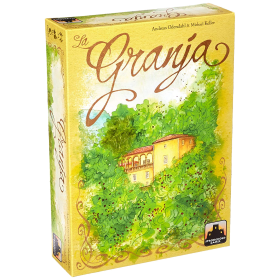La Granja
 Develop your farm and compete to deliver goods to the market at the right time.
Develop your farm and compete to deliver goods to the market at the right time.
In La Granja, players control small farms by the Alpich pond near the village of Esporles on the island of Mallorca. Over time, the players develop their farms and deliver goods to the village. Players are vying to earn the title of "La Granja" for their country estate!
Over the course of 6 game rounds, players will expand their farm by adding fields, farm extensions, market barrows, and helpers. They will earn VPs by delivering goods to the village of Esporles. It is important to observe the actions of other players, manipulate turn order, and adjust your strategy based on the dice and cards.
La Granja is a fascinating game that requires careful planning. Timing and speed is crucial. However, successful players must cope with the uncertainty of events during the game. The player who has earned the most victory points at the end of the game is the winner and new owner of the La Granja estate!
Spielerzahl: 1 - 4
Spieldauer: 32 mn
Komplexität: 3 / 5
Spiele La Granja und 1229 andere Spiele online.
Kein Download notwendig, spiele direkt im Webbrowser.
Mit deinen Freunden und tausenden Spielern aus der ganzen Welt.
Kostenlos.

Spiele La Granja und 1229 andere Spiele online.
Kein Download notwendig, spiele direkt im Webbrowser.
Mit deinen Freunden und tausenden Spielern aus der ganzen Welt.
Kostenlos.

Kurzregel
La Granja: Strategisches Wirtschaften in sechs Runden
In "La Granja" versuchen die Spieler, durch geschicktes Wirtschaften und strategische Entscheidungen die meisten Punkte zu erzielen. Punkte gibt es für die Lieferung von Waren an zentrale Gebäude oder für die Erfüllung persönlicher Aufträge. Das Spiel erstreckt sich über sechs Runden, in denen die Spieler ihre Karten optimal einsetzen müssen, denn jede Karte kann auf vier verschiedene Arten verwendet werden.
Kern des Spiels
Das Spiel konzentriert sich auf drei Hauptaktionen:
- Sammeln von Gütern für den eigenen Bauernhof
- Liefern von Gütern an zentrale Gebäude (Handwerksbetriebe) oder zur Erfüllung persönlicher Aufträge (Marktkarren)
- Erwerb von Fähigkeiten und Verbesserungen für das Sammeln und LiefernZiel ist es, über sechs Runden so viele Punkte wie möglich zu sammeln. Der Spieler mit den meisten Punkten gewinnt.
Rundenablauf
Jede Runde besteht aus vier Phasen:
- Farmphase (Blau): Karten auf dem Bauernhof ausspielen, Einkommen generieren, Güter produzieren.
- Erntephase (Grün): Würfeln, um zusätzliche Vorteile zu erhalten: Einkommen generieren, Güter produzieren, Karten spielen/ziehen, Verbesserungen/Siestas erhalten, Lieferungen erhalten.
- Transportphase (Grau): Liefermarker erhalten und Güter zu Marktwagen oder Handwerksbetrieben liefern.
- Wertungsphase: Punkte erhalten und die Zugreihenfolge aktualisieren.Zusätzlich zu den Phasen gibt es "Jederzeit"-Aktionen, die während oder zwischen den Phasen durchgeführt werden können. Diese Aktionen ermöglichen es den Spielern, sich für die nachfolgenden Phasen strategisch zu positionieren. Sie sind auch die einzige Möglichkeit, Güter von Rohstoffen zu verarbeiten.
Punkte erzielen
Punkte können auf folgende Arten erzielt werden:
- Lieferung aller Waren zur Vervollständigung eines Marktkarrens (Punkte gemäß Angabe im Sechseck).
- Lieferung aller Waren zur Vervollständigung einer Reihe in einem Handwerksbetrieb (verschiedene Punktzahlen).
- Entfernen von Markern anderer Spieler vom zentralen Marktbrett (1 Punkt pro entferntem Marker).
- Platzieren eigener Marker auf dem zentralen Marktbrett am Ende einer Runde (1 Punkt pro Marker).
- Position auf der Siesta-Leiste am Ende einer Runde.
Warenbeschaffung (Farmphase)
Es gibt verschiedene Möglichkeiten, während des Spiels Güter zu sammeln. Letztendlich sollte man Güter sammeln, die zu einem bestimmten Satz gehören, da dies die Hauptmethode ist, um Siegpunkte zu erhalten. Die erste Phase jeder Runde ist die Farmphase, in der der eigene Bauernhof produziert.
Karten ausspielen
Zu Beginn jeder Runde spielen die Spieler eine Karte aus (in der ersten Runde zwei). Eine Karte kann auf eine von vier Arten verwendet werden:
- Als Farmerweiterung: Erhöht die Handkartenzahl, das zusätzliche Lieferlimit, das Einkommen oder das Schweinelimit. Die erste Erweiterung kostet 1 Ressource (Ware, Münze oder Siegpunkt). Die nächste Erweiterung kostet 2 einzigartige Ressourcen, die dritte 3 usw. Die Karte wird so unter den rechten Rand des Spielertableaus geschoben, dass nur die rechte Seite sichtbar ist.
- Als Feld: Die Karte wird unter den linken Rand des persönlichen Spielertableaus geschoben, so dass nur die linke Seite der Karte sichtbar ist.
- Als Helfer: Der mittlere und untere Teil jeder Karte zeigt eine spezielle Fähigkeit, die einmalig eingesetzt werden kann. Die meisten Helfer können nur einmal pro Runde eingesetzt werden (1x-Symbol unten). Die Karte wird so unter den unteren Rand des Spielertableaus geschoben, dass nur der Helfertext sichtbar ist. Helfer werden über die "Jederzeit"-Aktion aktiviert.
- Als Marktwagen: Spezielle Aufträge, die beliefert werden können. Die benötigten Waren sind in der obersten Reihe der Karte abgebildet. Die Karte wird so unter den oberen Rand des Spielertableaus geschoben, dass nur die obersten zwei Reihen sichtbar sind.
Einkommen erhalten
Nach dem Ausspielen der Karten erhalten die Spieler Einkommen, basierend auf der Anzahl der blauen Münzen auf den Farmerweiterungen. Zudem wird die Handkartenzahl auf das Handkartenlimit aufgefüllt.
Produktion auf den Feldern
Felder produzieren Güter, sofern der jeweilige Platz frei ist. Güter auf Feldern können nicht gelagert werden, um Platz für neue Güter zu schaffen.
Ferkelproduktion
Wenn mindestens zwei Schweine vorhanden sind, erhält man ein zusätzliches Ferkel. Falls kein Platz vorhanden ist, kann kein Ferkel produziert werden (ein neugeborenes Ferkel kann nicht sofort verkauft werden!). Zusätzlicher Platz kann durch das Ausspielen einer Karte als Farmerweiterung geschaffen werden.
Dachziegel kaufen
Nach Einkommen, Feldproduktion und Ferkelproduktion kann jeder Spieler einen Dachziegel kaufen. In Runde 1 kostet ein Dachziegel 1 Münze, in Runde 2 kostet er 2 Münzen usw. Der erste Dachziegel bringt 0 Punkte, der nächste 1 Punkt, der nächste 2 Punkte usw., bis zu maximal 5 Dachziegeln. Dachziegel bieten auch einmalige Fähigkeiten.
Warenbeschaffung (Erntephase)
Nach der Produktion und dem Kauf von Dachziegeln können die Spieler zusätzliche Waren und Vorteile erhalten. Es werden Würfel geworfen (doppelte Spieleranzahl plus eins). Reihum wählt jeder Spieler zweimal einen Würfel und führt dessen Effekt aus. Der verbleibende Würfel wird von allen Spielern genutzt. Mögliche Würfeleffekte:
- 1: Ein Schwein erhalten (muss ggf. sofort verkauft werden, wenn kein Platz vorhanden ist).
- 2: Eine Karte spielen, eine Karte ziehen, eine Olive, Weizen oder Trauben erhalten.
- 3: Olive + Weizen, Olive + Trauben oder Weizen + Trauben nehmen.
- 4: 4 Münzen erhalten.
- 5: 2 Verbesserungen, eine Verbesserung + Siesta oder 2 Siestas nehmen. Verbesserungen (Sterne) ermöglichen die Umwandlung einer Ressource in eine andere (Olive in Lebensmittel, Weizen in Lebensmittel, Trauben in Wein oder Schwein in Fleisch). Eine Siesta (Hut) verbessert die Zugreihenfolge.
- 6: Eine Lieferung (Esel) oder 2 Münzen nehmen.
Warenlieferung (Transportphase)
Um Waren in Punkte umzuwandeln, müssen sie einzeln geliefert werden. Jeder Esel repräsentiert eine Lieferung.
Liefermarker auswählen
Jeder Spieler hat 4 Liefermarker mit einer Kombination aus Eseln und Hüten. Jeder Spieler wählt geheim einen Marker aus. Die Spieler führen ihre Lieferungen in Zugreihenfolge durch. In den Runden 1, 2 und 3 muss jeweils ein anderer Marker gewählt werden. In Runde 4 werden die Marker zurückgesetzt, aber auch in den Runden 4, 5 und 6 muss ein jeweils anderer Marker gewählt werden.
Zugreihenfolge neu berechnen
Für jeden Hut auf ihrem Liefermarker rückt ein Spieler auf der Siesta-Leiste um ein Feld vor. Anschließend werden die Zugreihenfolge-Marker neu verteilt, wobei die Marker oben früher an der Reihe sind als die Marker darunter. Die Siesta-Leiste wird erst später zurückgesetzt.
Lieferungen durchführen
Für jeden Esel kann ein Spieler eine Ressource von seinem Hof zu einer Reihe auf dem zentralen Spielplan (Handwerksbetrieb) oder zu einem Marktwagen auf seinem Hof transportieren. Wenn ein Spieler eine Reihe vervollständigt, erhält er den entsprechenden Handwerksmarker, der sowohl einen sofortigen als auch einen fortlaufenden Vorteil bietet. Jeder Spieler kann jeden Bereich nur einmal vervollständigen. Wenn ein Spieler einen Handwerksbetrieb abschließt, entfernt er die Marker aus dieser Reihe und legt seinen Marker neben das Gebäude, um anzuzeigen, dass es abgeschlossen wurde. Die Spieler erhalten Punkte in Höhe der aktuellen Runde (z. B. würde der Abschluss eines Handwerksbetriebs in Runde 4 4 Punkte geben), plus 1 Punkt, wenn sie als Erste diesen Betrieb abgeschlossen haben, und plus 1 Punkt, wenn ein anderer Handwerksbetrieb eröffnet wurde.
Zusätzliche Lieferungen
Nachdem alle Spieler ihre Lieferungen durchgeführt haben, kann jeder Spieler bis zu seinem zusätzlichen Lieferlimit (gemäss der Farmerweiterung) Lieferungen kaufen, indem er eine Münze pro Lieferung bezahlt.
Handwerksbetriebe
Die Reihen auf dem Hauptspielbrett stellen Sets dar, die als Handwerksbetriebe bezeichnet werden. Es gibt 6 verschiedene Bereiche mit identischen Reihen. Wenn ein Spieler an einen Handwerksbetrieb liefert, markiert er die gelieferte Ware mit seiner Farbe - jede Farbe sollte sich in einer separaten Reihe befinden. Wenn ein Spieler eine Reihe vervollständigt, erhält er den Handwerksmarker des jeweiligen Bereichs, der sowohl einen sofortigen als auch einen fortlaufenden Vorteil bietet. Jeder Spieler kann jeden Bereich nur einmal vervollständigen. Beispiele für Handwerksbetriebe:
- Lebensmittel, Wein, Fleisch: Sofort: 1 Lieferung sofort + Punkte gemäß Position auf der Hut-Leiste. Fortlaufend: Jeder Liefermarker hat +1 Esel und +1 Hut.
- Olive, Weizen, Trauben, Münze, Schwein: Sofort: 2 Punkte. Fortlaufend: Beim Vervollständigen eines Handwerksbetriebs +2 Punkte.
- 3 Kisten: Sofort: Eine Kiste erhalten. Fortlaufend: Beim Einkommen erhalten zusätzlich eine Kiste.
Marktwagen
Ein Marktwagen ist ein individueller Auftrag, den ein Spieler auf seinem Hof platziert hat und der typischerweise zwei bis vier Waren enthält. Wenn ein Spieler alle Waren in der obersten Reihe liefert, erhält er eine Kiste (Ware) und die Anzahl der Punkte, die im Sechseck in der zweiten Reihe angegeben sind. Zusätzlich platziert er einen Marker auf einem Feld mit der gleichen Nummer auf dem zentralen Marktbrett. Alle Marker von Gegnern, die sich auf angrenzenden Feldern mit niedrigeren Nummern befinden, werden entfernt, und der aktuelle Spieler erhält 1 Punkt pro entferntem Marker. Die Kiste kann gegen einen von mehreren Vorteilen eingetauscht werden (siehe "Eine Kiste verwenden").
Wertungsphase
Am Ende jeder Runde erhalten die Spieler Bonuspunkte basierend auf ihrer Position auf der Siesta-Leiste sowie einen Punkt für jedes verbleibende Teil auf dem zentralen Markt. Anschließend werden die Marker von der Siesta-Leiste gestapelt, um die Zugreihenfolge widerzuspiegeln, und neue Dachziegel werden ausgeteilt. Eine neue Runde beginnt, oder nach 6 Runden ist das Spiel vorbei.
Spielende
Am Ende des Spiels werden alle Marker auf dem Bauernhof zum aktuellen Preis in Geld umgewandelt, anschliessend erhält man pro 5 Münzen einen Siegpunkt. Der Spieler mit den meisten Punkten gewinnt!
"Jederzeit"-Aktionen
Einige Aktionen können jederzeit während des Zuges eines Spielers durchgeführt werden – d. h. vor oder nach der üblichen Aktion. Spieler können mehrere Aktionen durchführen, wenn alle anderen Bedingungen erfüllt sind.
- Eine Ware verkaufen: Zum angegebenen Preis in Münzen: Olive: 1, Weizen: 1, Trauben: 2, Schwein: 3.
- Eine Ware kaufen: Zum angegebenen Preis in Münzen: Olive: 3, Weizen: 3, Trauben: 4, Schwein: 5.
- Eine Ware veredeln: Zum angegebenen Preis in Münzen: Olive zu Lebensmittel: 2, Weizen zu Lebensmittel: 2, Trauben zu Wein: 3, Schwein zu Fleisch: 4.
- Einen Dachziegel verwenden: Ein Dachziegel bietet einen einmaligen Vorteil, z. B. den Erhalt eines Schweins oder die Veredelung einer Ware. Nach der Verwendung wird er umgedreht. Dachziegel können nur in der Farm- oder Erntephase verwendet werden.
- Eine Kiste (Ware) verwenden: Eine Kiste (Ware) kann gegen einen von mehreren Vorteilen eingetauscht werden: vier Münzen, zwei verschiedene Erntegüter, eine Karte spielen, eine Karte ziehen, ein Schwein oder bis zu zwei sofortige Veredelungen.
- Einen Helfer verwenden: Die meisten Helfer müssen aktiviert werden, um ausgelöst zu werden. Wenn er durch eine Aktion ausgelöst wird (z. B. Geld erhalten oder Schweine züchten), verwende den Helfer nach der Aktion, um einen Vorteil zu erhalten.

